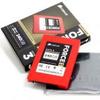SSD Performance File Copy tests
SSD Performance File Copy tests
In this round of benchmarks we start off with our latest additions in our test suite, real-world file copy tests. Currently certain controllers benefit from compressed files, while others don't. Certain storage units hate small files, others work well with it. So it only makes sense to do some manual tests on that.
Any storage unit's nightmare, whether that is an HDD or SSD, is storing really small files as fast as possible. So on our Test PC we created a RAMDISK partition (we can't use an SSD/HDD here as it would be a bottleneck) in which we install roughly 500MB worth of text files, highly compressible. We now measure how many seconds it takes to copy the files from the RAMDISK towards the storage unit tested today.
We copy many small files that can be compressed. But we made the files so small that the file-system will simply choke up. The results that you see in the above chart as based on a near silly test, we take 0.52 GB of random text files sized from just merely bytes (the vast majority) up-to 250KB.

In total the copy instruction queues up over 113,586 files for this test, and these are being copied from the RAMDISK towards the storage unit in the number of minutes shown above. Lower is obviously better.
Now the bottleneck is the file-system and the actual PC itself. This test is bizarre in the sense that you drop hundred-thirteen-thousand miniscule files onto the storage solution. The difference will be marginal, even compared to HDDs as NAND based flash solutions behave very similar.
File copy write test - Slightly larger compressed files.
For the second real world file-copy test we take compressed data, like small JPG and MP3 files. We have them in random sizes from less than one KB up-to slightly larger 2MB files to emulate MP3 copying better (which most of you can relate to a notch better).

So we know that once we pass 16/32KB sizes, SSDs speed up almost exponentially. Hence we increased the total workload here towards 3 GB with 4272 compressed files in total, with a maximum files-size of 2MB.
We drop all these MP3/JPG files onto the drive (copied from the RAMDISK) and measure the amount in seconds it takes for the storage unit to deal with it. We measure the amount of seconds needed to finish the job. Lower is obviously better.
Performance Game load times
Here at Guru3D.com the audience is catered to gamers. And as such I like to start off with three real world performance game tests for a change.

We take the Alien Versus Predator benchmark and run it a couple of times. From the moment we click on the icon and load up the game to the moment the benchmark start to run is what we are looking at for load time in seconds.

